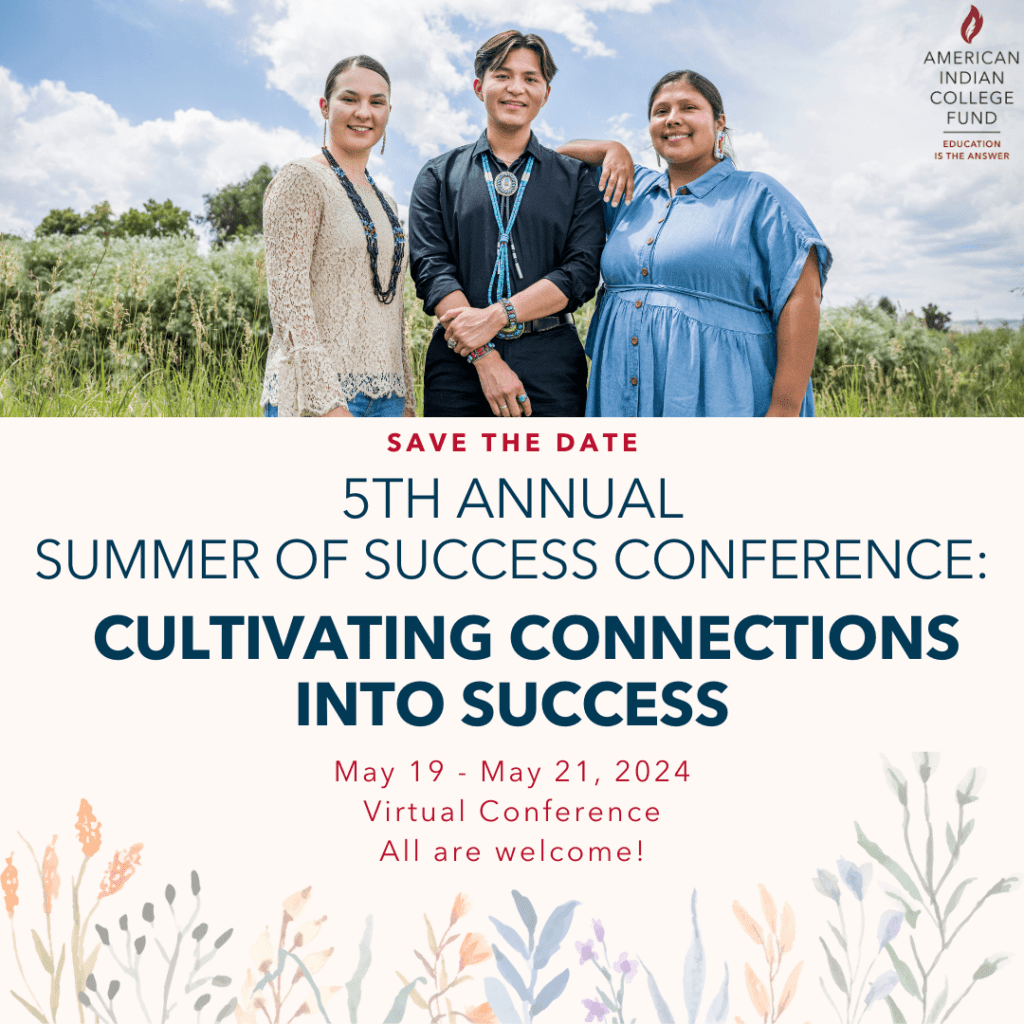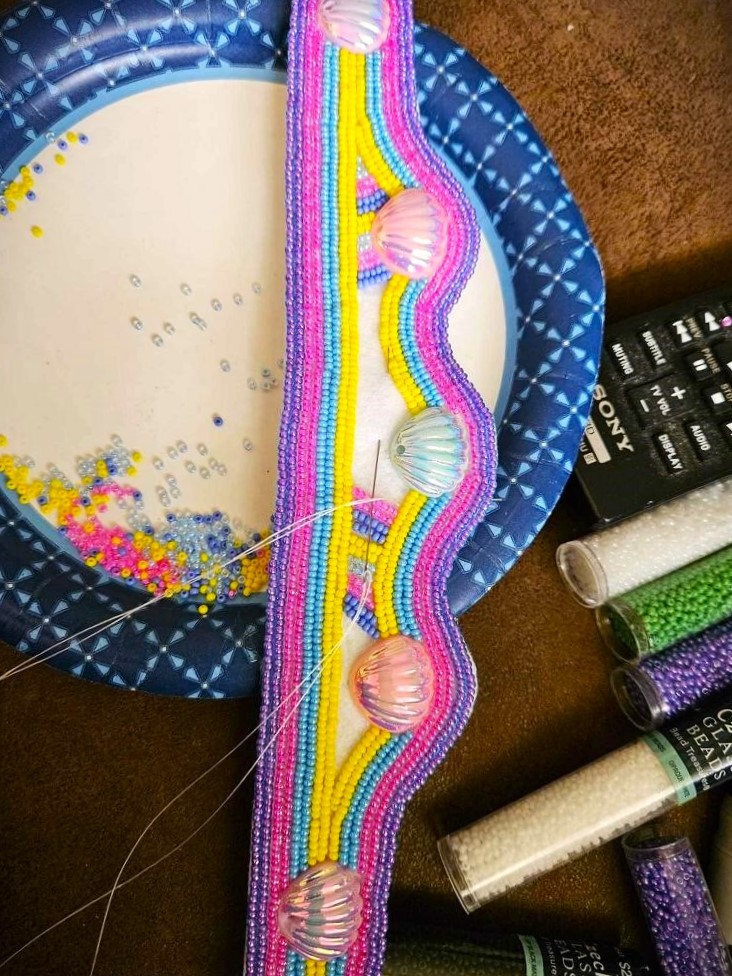Tribal College Scholarship Timeline
A Tribal College Transfer is a student who is earning an associate’s degree at a tribal college and plans on transferring to a four-year university to earn a bachelor’s degree.
The benefits of attending a tribal college before transferring is:
- Remain close to home and family.
- Tribal colleges’ cultural curriculum strengthens
identity. - Strong sense of community.
- Saving money on the first 2 years of school.
- Academic preparedness.

Year One
Fall
1st Semester
- Apply for Financial Aid (FAFSA)
- Meet with an Advisor and form a 2-yr associate degree course plan
- Research schools where your credits will transfer
- Set a goal graduation date
- Select a major
Spring
2nd Semester
- Apply for a minimum of two scholarships
- Meet with an Advisor to discuss transfer options after your tribal college graduation
- Research application deadlines for transfer schools and mark them in your calendar
- Apply for internships
Summer
- Take the ACT or SAT (if your transfer school requires new test scores for admission)
- Work in a summer internship
- Earn community service hours -looks great on scholarship applications and applications to competitive schools, e.g. Harvard
- Apply for internships
Year Two
Fall
3rd Semester
- Apply for FAFSA
- Create a financial plan for your transfer
- Choose 3 schools to apply to
- Are you on track? Review graduation goal & 2-yr course plan
- Work on transfer admissions essays. Required for competitive schools
Spring
4th Semester
- Complete transfer admissions applications
- Create a financial plan for your transfer
- Apply for a minimum of two scholarships
- Campus visits to your transfer college
- Final decision. Choose your college!
- Apply for internships or seek out community service opportunities
Summer
- Review and accept financial aid package
- Inform schools you won’t be attending
- Attend orientation
- Research resources available for challenges you may encounter
Additional Scholarships
There are thousands of scholarship opportunities in addition to the Full Circle and Tribal College & University (TCU) scholarship programs we offer. We advise all students to apply to as many as they are eligible for. Discover more scholarship opportunities available outside of the American Indian College Fund.
Related Pages
Students Social Media
News & Events
American Indian College Fund Hosts Virtual Annual Summer of Success Conference
American Indian College Fund Hosts Virtual Annual Summer of Success Conference
 Students will learn skills to prepare for a meaningful college experience
Students will learn skills to prepare for a meaningful college experience
The American Indian College Fund (College Fund) will host its Fifth Annual Summer of Success Conference: Cultivating Connections into Success from May 19 to May 21. This three-day, interactive online event is tailored to high school and college students, staff, faculty, and families, centering Native culture, experiences, and determinants of college success. Participants will learn strategies for achieving a meaningful college experience that moves them towards their career aspirations. Faculty and staff will also discuss ways to support student programming for college and career success.
While this conference is free and open to everyone, Sunday, May 19 is the designated “All Relatives Day.” Starting at 1 p.m. MDT, the College Fund will host five different sessions focusing on connecting parents to resources, an informative FAFSA session, professional journey resources, and how to obtain accessibility accommodations in college. For participants interested in attending more than one session, the schedule is designed to allow the opportunity to attend each session twice. Each session is tailored for high school, college, tribal, traditional, and nontraditional students, and provides a broad overview of what students can expect in their academic journeys.
To accommodate for work and school schedules, sessions on Monday, May 20 and Tuesday, May 21 will start at 3 p.m. MDT. These sessions cover a variety of topics including professional development, growing alumni networks, and other college tips and tricks. All topics will be covered in interactive informative sessions, small group workshops, professional and student panel discussions, and by guest speakers and experts in higher education.
Each day will start with an opening session hosted by a College Fund student ambassador and a professional community leader, providing an opportunity for attendees to engage with the College Fund team and hear directly from scholars and guest speakers.
Registration for the Fifth Annual Summer Conference: Cultivating Connections into Success is now open. Be sure to register for free today and mark your calendars for your favorite sessions! The full conference schedule is outlined in the registration, along with the names and biographies of our guest speakers.
To register for the free conference, please visit here.
If you have any questions or concerns, please reach out to the American Indian College Fund Student Success Services team at sssadmin@collegefund.org or by phone at (720) 902-4283.
About the American Indian College Fund— The American Indian College Fund has been the nation’s largest charity supporting Native higher education for 34 years. The College Fund believes “Education is the answer” and provided $17.4 million in scholarships and other direct student support to American Indian students in 2022-23. Since its founding in 1989 the College Fund has provided more than $319 million in scholarships, programs, community, and tribal college support. The College Fund also supports a variety of academic and support programs at the nation’s 35 accredited tribal colleges and universities, which are located on or near Indian reservations, ensuring students have the tools to graduate and succeed in their careers. The College Fund consistently receives top ratings from independent charity evaluators and is one of the nation’s top 100 charities named to the Better Business Bureau’s Wise Giving Alliance. For more information about the American Indian College Fund, please visit www.collegefund.org.
Journalists—The American Indian College Fund does not use the acronym AICF. On second reference, please use the College Fund.
In Memoriam: Carole Falcon-Chandler
The American Indian College Fund was saddened to hear of the passing of Carole Falcon-Chandler, longtime president of Aaniiih Nakoda College (ANC), a tribal college located on the Fort Belknap Indian Reservation in Montana, on April 23, 2024.
Falcon-Chandler served ANC for 28 years: eight as the college’s dean of students and 20 as president. Falcon-Chandler was a strong and accomplished leader. During her tenure as president, she guided the ANC to financial stability and the college remained debt-free. She became an expert on the accreditation process and addressed the recommendations from the Northwest Commission on Colleges and Universities. She went on to serve as one of the accrediting board’s commissioners.
Falcon-Chandler helped establish ANC’s American Indian Studies Department and the community’s first immersion school for children, The White Clay Immersion School, which was housed on a tribal college campus. Under her leadership the college also boasts the Ekib Tsah ah Tskik (Sitting High) Cultural Center, the Tataga Kni (Returning Buffalo) Workforce Training Center, Wiyukja Wicoti Technology Center, Maintenance Shop, Carpentry Building, greenhouse, playground, and garden.
She also championed changing the college’s name from Fort Belknap College to Aaniiih Nakoda College in 2011 to better reflect the community the tribal college serves. An historic ceremony centered on educational empowerment highlighted the name change and recognized the tribal nations of the Fort Belknap Indian Community. Falcon Chander also led the way in working to establish ANC’s associate of science in nursing—registered nursing program and its first bachelor’s degree program in Aaniiih Nakoda ecology.
In addition to growing programs for students, she also implemented professional development programs for faculty and staff and grew the college’s American Indian faculty from zero percent when she began as president in 2000 to 75% at the time of her retirement in 2020, and of those, 42% were ANC graduates.
Falcon-Chandler served on the American Indian College Fund Board of Trustees from 2001-2009 and again 2012-2020 and was Chairwomen of the Board in fiscal year 2007-2008. She was named the College Fund’s President of the Year in 2009.
A passionate advocate for tribal colleges and universities, Falcon-Chandler told Montana’s Great Falls Tribune upon her retirement, “Tribal colleges are different. We teach our students in different ways so they can feel a sense of belonging.”
Cheryl Crazy Bull, President and CEO of the American Indian College Fund, said, “President Falcon Chandler was an icon of the tribally controlled education movement. She believed deeply in the brilliance and strength of Native people and was always full of caring support for her students, community, and colleagues. She was a visionary who fulfilled her commitment to her people through investment in language restoration, the sharing of cultural knowledge, and support of the arts. We pray for her spirit to have a good journey to be with our ancestors and offer our joyful memories of her to her loved ones and community as they send her on her way.”
Making Good on a Promise for the Next Generation
By Arin Davis, LCOOU GED/HSED Coordinator
Lac Courte Oreilles Ojibwe University, through support and partnership with organizations such as the American Indian College Fund, provides a comprehensive adult education program at the university. The program is free to anyone and is also available at multiple tribal outreach sites in northern Wisconsin. Roberta Miller, a community member, obtained her high school diploma this year through hard work after enrolling in LCOOU’s high school equivalency diploma (HSED) program pathway. The program is based on competency rather than tests, and allows students to obtain their HSED by completing relevant coursework.
Roberta grew up in Milwaukee, Wisconsin. At age 16, she was a young teenage mother needing to care for her first son and dropped out of high school. With little help or support from others, she raised three young boys in Milwaukee. The environment was very difficult, and she was concerned with violence and gang influences in her local community, so in 1999 she moved to the LCO community near Hayward, Wisconsin. Roberta promised herself that someday she would return to school to get her diploma.
Roberta made good on her promise and at age 51, she received her high school diploma through hard work, dedication, and instruction at LCOOU. Her sons are now grown men and she is a proud grandmother.
Roberta’s commitment to obtaining her diploma is just one example of who she is as a role model and support to her children and grandchildren. The photos show Roberta’s beadwork in progress for two of her granddaughters. The first image is a flower pattern for her oldest granddaughter, Zaagi’s medicine bag. The second image is a regalia head band for a granddaughter, Amillie. Lac Courte Oreilles Ojibwe University is proud to support adult learners like Roberta and her family in the community.

Roberta’s Headband Beading in Progress

Roberta’s Medicine Bag Design
